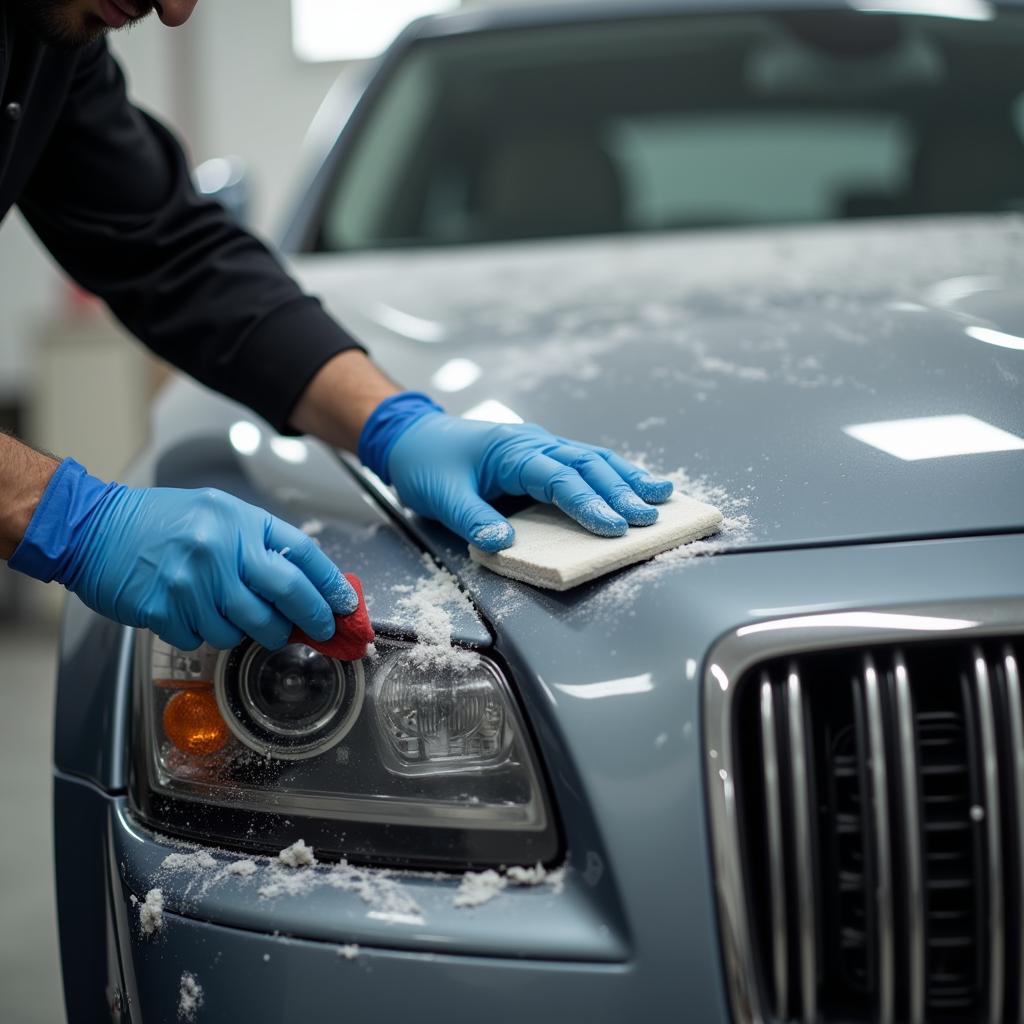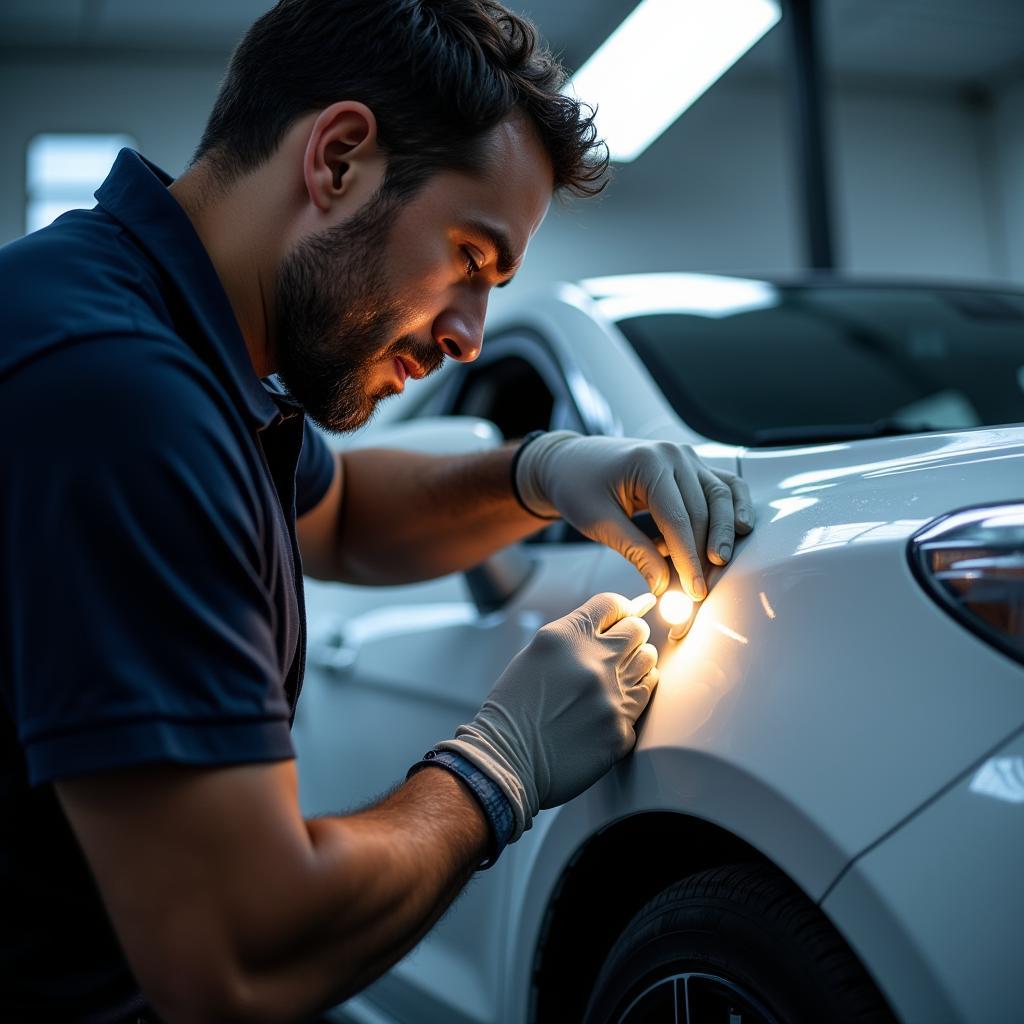You’re finally ready to give your car the fresh coat of paint it deserves. But before you head to the body shop, a question might pop into your mind: Should you detail your car before repainting? The answer, like many things in the automotive world, is a bit nuanced.
While it might seem counterintuitive to meticulously clean a car that’s about to be covered in paint, there are compelling reasons why car detailing before repainting is not only beneficial but can significantly impact the final result. Let’s dive into the details and explore why this extra step is worth considering.
Why Detailing Before Repainting Matters
Detailing your car before repainting is akin to prepping a canvas before painting a masterpiece. A clean, smooth surface ensures the paint adheres properly and the final finish is flawless. Here’s why:
- Flawless Paint Adhesion: Detailing removes contaminants like dirt, grime, road tar, and even invisible contaminants that can interfere with paint adhesion. A thorough cleaning ensures the new paint bonds directly to the car’s surface, minimizing the risk of peeling, bubbling, or uneven texture later on.
- Enhanced Paint Inspection: A clean car allows the auto body technicians to thoroughly inspect the paintwork for any imperfections, dents, scratches, or rust spots that might need attention before painting. This ensures a higher quality paint job and prevents surprises down the line.
- Superior Finish Quality: Even microscopic particles on the car’s surface can get trapped under the new paint, resulting in a rough, bumpy texture. Detailing removes these particles, creating a smooth surface for the paint to adhere to, ultimately leading to a smoother, more polished final finish.
 Car Detailing Before Repainting
Car Detailing Before Repainting
What Does Detailing Before Repainting Entail?
Detailing before repainting goes beyond a simple wash and wax. It involves a comprehensive multi-step process that ensures every inch of your car is prepped for a flawless paint job. Here are the key steps involved:
- Thorough Wash and Decontamination: This involves a meticulous hand wash using pH-neutral car wash soap to remove loose dirt and grime. This is followed by a clay bar treatment to lift off embedded contaminants that washing alone can’t remove.
- Paint Correction (If Necessary): Depending on the condition of your car’s paint, paint correction might be necessary to remove scratches, swirl marks, and other imperfections. This typically involves machine polishing using different grades of polish to level the paint surface.
- Panel Alignment and Gap Inspection: Before painting, the body shop will inspect all panels and gaps to ensure they are properly aligned. This step is crucial to ensure a seamless finish after painting.
- Final Cleaning and Masking: The car undergoes a final cleaning to remove any polishing residue. The areas that won’t be painted, like windows, trim, and lights, are then carefully masked off to protect them from overspray.
 Inspecting Car Paint for Imperfections
Inspecting Car Paint for Imperfections
Is It Always Necessary to Detail Before Repainting?
While detailing before repainting offers significant benefits, there are instances where it might not be strictly necessary:
- New Cars: Brand new cars with factory paint in pristine condition generally don’t require extensive detailing before repainting. A simple wash and decontamination might suffice.
- Minor Paint Repairs: For small touch-ups or repairs on a relatively well-maintained car, a less intensive detailing process might be acceptable.
However, it’s always best to consult with a reputable auto body shop or a professional detailer to assess the condition of your car’s paint and determine the best course of action.
Detailing After Repainting: The Finishing Touch
While detailing before repainting is crucial, don’t overlook the importance of detailing after the new paint has cured. This final touch enhances the paint’s gloss, adds a layer of protection, and keeps your car looking its best. Post-repaint detailing typically includes:
- Gentle Wash and Dry: A few weeks after repainting, once the paint is fully cured, a gentle hand wash using a pH-neutral soap and a soft wash mitt is recommended.
- Paint Sealant or Ceramic Coating: Applying a paint sealant or a ceramic coating provides an additional layer of protection against UV rays, environmental contaminants, and minor scratches.
- Interior Detailing: While the exterior is the primary focus during repainting, consider giving the interior a refresh as well. This includes vacuuming, cleaning the upholstery, and conditioning leather surfaces.
Conclusion
Detailing your car before repainting is an investment that pays off in a superior, long-lasting paint job. By ensuring a flawlessly prepped surface, you’re setting the stage for a smooth, even paint application and a stunning final result. Remember to consult with a trusted auto body professional or a detailing expert to determine the best approach for your car’s specific needs and condition.

Leave a Reply